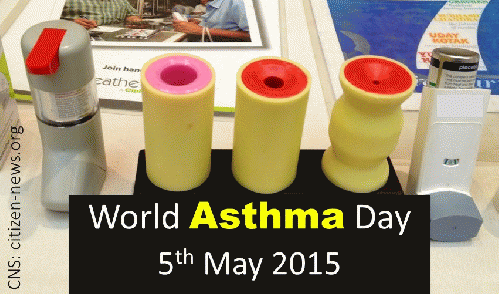(CNS):

'You can control your asthma' - theme of World Asthma Day, 5th May
(Image by Citizen News Service - CNS: citizen-news.org) Details DMCA
What is Asthma?
Asthma is a noncommunicable chronic lung condition that is caused by the swelling and inflammation of the airways, that impairs breathing. An asthma attack is characterised by the swelling of the bronchial tubes, resulting in a reduction of the flow of air into and out of the lungs and the production of mucus, resulting in breathlessness, wheezing, and fatigue. While the mortality rate of asthma is lower than that for other chronic diseases, asthma can hinder day-to-day life by limiting activity and reducing quality of life. And yet, asthma is under-diagnosed and under-treated.
According to the Global Asthma Report 2014, an estimated 334 million are living with asthma. It is the most common non communicable chronic disease in children too. A survey done by the International Study of Asthma and Allergies in Childhood (ISAAC) found that about 14% of the world's children were likely to have had asthmatic symptoms.
This public health issue affects high and low-income countries equally, but the burden of mortality falls most heavily on the developing world, where some 80% of asthma-related deaths occur.
Risk factors for asthma
Asthma is genetic in origin and can be affected by a host of environmental factors. The strongest risk factors for developing asthma are exposure to inhaled particles that may provoke allergic reactions or irritate the airways. In most cases, the triggers are ubiquitous and unavoidable (exercise, cold air, allergens, viruses etc). However, some triggers can, and should, be avoided (like exposure to cigarette smoke). Air pollution is also a trigger that requires community action. Urbanization too has been associated with an increase in asthma, but the exact nature of this relationship is unclear.
Asthma - hard nut to crack
(Note: You can view every article as one long page if you sign up as an Advocate Member, or higher).





